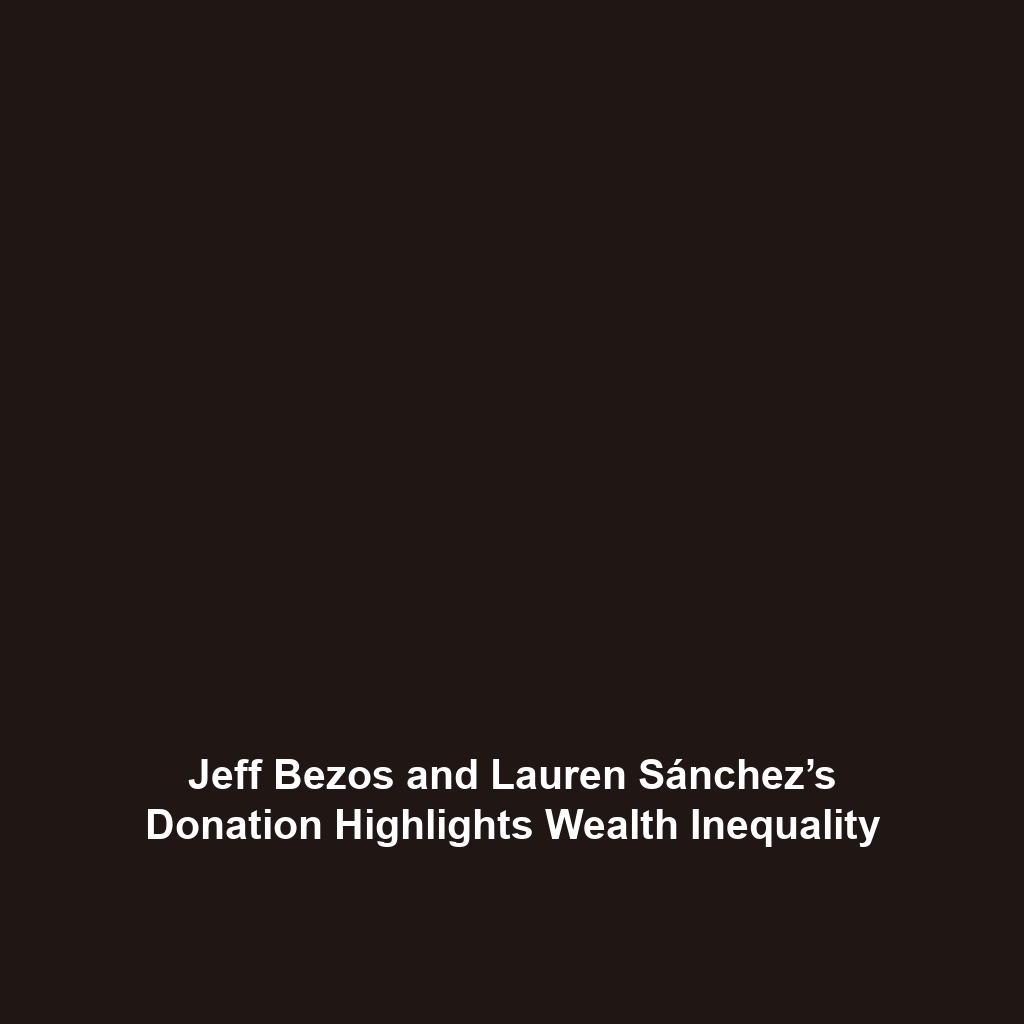Your cart is currently empty!
Jeff Bezos and Lauren Sánchez’s Donation Highlights Wealth Inequality

Jeff Bezos and Lauren Sánchez’s Donation Highlights Wealth Inequality
Jeff Bezos and Lauren Sánchez’s recent philanthropic efforts have sparked a renewed debate surrounding wealth inequality and the role of billionaire giving in addressing systemic issues. As public figures and significant beneficiaries of the modern economy, Bezos and Sánchez’s donation has ignited discussions on whether large sums donated by wealthy individuals truly contribute to solving deep-rooted social problems.
The Donation: Details and Context
In a move characterized by both generosity and controversy, Bezos and Sánchez pledged a substantial donation aimed at various causes including education, environmental sustainability, and homelessness. The exact figure has not been disclosed, but sources indicate that it aligns with the couple’s long-standing commitment to philanthropy which began gaining traction around 2020 when Bezos announced the Bezos Earth Fund, which committed $10 billion to combat climate change.
Despite the positive intentions behind such large donations, critics argue that such philanthropic acts do little to dismantle the structures that sustain wealth inequality. According to the Institute for Policy Studies, the wealth of U.S. billionaires increased by $2 trillion during the COVID-19 pandemic, while millions suffered economic hardship. This stark contrast raises questions about wealth accumulation in the hands of a few and its implications for society as a whole.
Debating the Impact of Billionaire Philanthropy
Billionaire philanthropy has long been a contentious subject among economists, social scientists, and activists. Proponents argue that private donations can fill gaps left by public funding and governmental inefficiency. Philanthropists like Bezos often focus on immediate solutions that could drive innovation and improve lives quickly.
On the other hand, critics emphasize that their charitable initiatives often lack transparency and accountability. Notably, they suggest that billionaires prefer to fund initiatives that reflect their personal interests rather than addressing the systemic sources of inequality, such as wealth concentration, tax policy, and access to resources. An article published by The Atlantic highlights that the focus of billionaire philanthropy often prioritizes disruptive innovations over systemic change, which could lead to more enduring solutions.
Wealth Inequality: A Growing Concern
Wealth inequality is not merely a financial issue—it has extensive social ramifications. Research shows that communities with greater economic inequality tend to face higher crime rates, lower educational outcomes, and poorer health conditions. Nobel Prize-winning economist Joseph Stiglitz has emphasized that extreme inequality can destabilize not just the economy, but also social cohesion, potentially leading to political unrest. “When the top 1% accumulate ever more wealth, it erodes the foundation of democracy,” Stiglitz stated during a recent interview.
The disparity is further illustrated in the U.S., where the top 10% of earners account for nearly 70% of the nation’s wealth. This has raised alarms about the diminishing middle class and the growing number of impoverished communities, prompting calls for a reevaluation of economic policies that favor the wealthy.
The Role of Government and Systemic Change
As conversations about philanthropy continue to unfold, many experts advocate for a more robust governmental role in addressing the root causes of wealth inequality. They argue that instead of relying heavily on private philanthropy, there should be more systemic solutions enacted by legislative bodies, including increased taxes on the wealthy, improved workers’ rights, and expanded access to education and healthcare.
Public policy expert Anand Giridharadas argues that while donations from billionaires can have tangible effects in the short term, they often divert attention from more significant systemic reforms that can ensure long-lasting change. “Our society is not just broke; it’s broken,” he said in one of his recent talks, emphasizing that philanthropy alone cannot heal the systemic issues at play.
Public Reactions and Expert Opinions
Public reactions to Bezos and Sánchez’s donation have been mixed. Some commend the couple for their willingness to give back, viewing it as a moral imperative among billionaires. Others have pointed out the paradox of extraordinarily wealthy individuals who possess the resources to effect widespread change through their wealth, yet whose charitable efforts may ultimately serve as a distraction from systemic reform.
Dr. Eileen Appelbaum, an economist specializing in labor and inequality, noted, “Billionaires like Bezos are often part of a system that perpetuates economic disparity. Their philanthropy might mitigate some effects but does not challenge the underlying structures that create and maintain wealth inequality.” This point has resonated with many who view philanthropy as a band-aid solution rather than a means of addressing the deeper issues of inequity and social justice.
Conclusion: A Call for Broader Solutions
As Bezos and Sánchez’s recent donation continues to stir debate about wealth inequality and philanthropy, it underscores the critical need for comprehensive discussions surrounding wealth distribution and social responsibility. While private charitable giving can address immediate needs and provide relief, it is essential to push for policy changes that directly tackle the root causes of inequality.
Ultimately, the conversation about billionaire philanthropy is a reflection of broader societal values and priorities. It highlights a vital question: Is charity a substitute for justice? To generate meaningful change, society must examine the structures that allow significant wealth to accumulate while vast segments of the population struggle. As discussions evolve, it will be crucial for both public and private sectors to engage in collaborative approaches that prioritize equity and sustainable development.
Leave a Reply